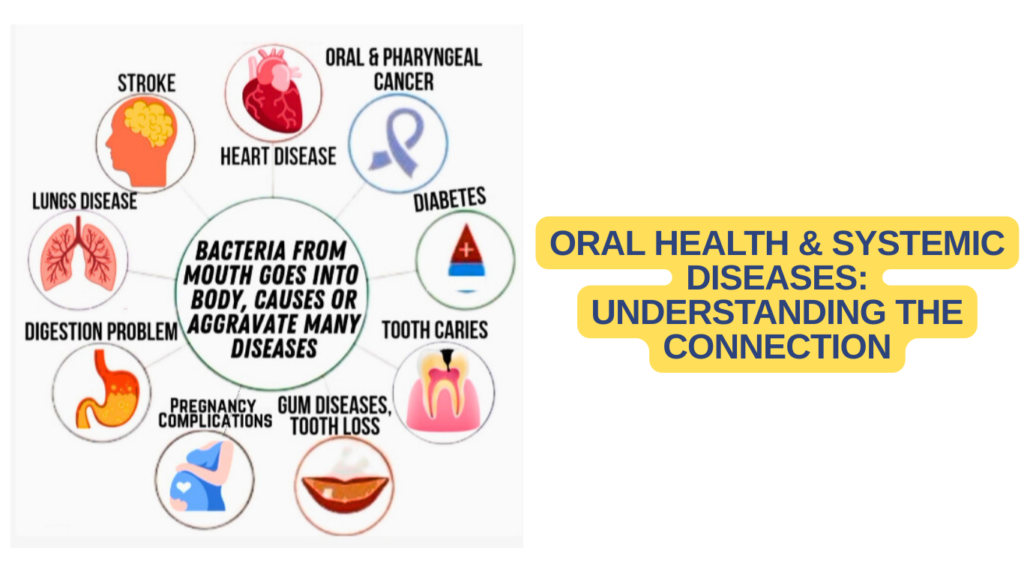Good oral health isn’t just about having a bright smile or fresh breath. It plays a critical role in maintaining overall health and preventing serious systemic diseases. Research has shown that poor oral health can contribute to or exacerbate conditions like heart disease, diabetes, respiratory infections, and even adverse pregnancy outcomes. Let’s delve deeper into the connection between oral health and systemic diseases to understand why oral hygiene is more important than ever.
1. The Role of Oral Health in Overall Health
The mouth is a gateway to the body, and it’s teeming with bacteria – both good and bad. While regular brushing, flossing, and dental check-ups can keep harmful bacteria in check, poor oral hygiene can lead to:
- Periodontal (Gum) Disease: An infection of the tissues that hold your teeth in place.
- Tooth Decay: Damage to the enamel caused by bacterial acids.
If left untreated, these conditions can allow bacteria to enter the bloodstream, triggering inflammation and affecting other parts of the body.
2. Heart Disease and Oral Health
Gum disease has been linked to an increased risk of cardiovascular diseases. Here’s how:
- Chronic Inflammation: The inflammation caused by periodontal disease can contribute to the narrowing of blood vessels, increasing the risk of heart attacks and strokes.
- Bacterial Spread: Oral bacteria can travel through the bloodstream, potentially causing infections like endocarditis (an infection of the inner lining of the heart).
Maintaining good oral hygiene can significantly reduce these risks.
3. Diabetes and Oral Health
The connection between oral health and diabetes is a two-way street:
- Gum Disease Worsens Diabetes: Chronic gum inflammation can make it harder to control blood sugar levels.
- Diabetes Increases Risk of Gum Disease: High blood sugar levels provide an ideal environment for harmful bacteria to thrive, leading to gum infections.
Regular dental care and proper diabetes management are crucial to breaking this cycle.
4. Respiratory Health and Oral Hygiene
Poor oral health can also impact respiratory health:
- Bacteria from the mouth can be inhaled into the lungs, leading to infections such as pneumonia.
- Patients with chronic obstructive pulmonary disease (COPD) are more susceptible to complications from poor oral hygiene.

5. Pregnancy and Oral Health
Pregnant women with gum disease are at a higher risk of:
- Preterm births
- Low birth weight babies
Hormonal changes during pregnancy can exacerbate gum issues, making oral care especially critical for expectant mothers.
6. Digestion problem:
It has been seen who have poor oral health suffer from digestion problems. It can affect in two ways-
- The micro-organisms present in the mouth with the food & bloodstream reach the stomach and can cause digestion problems.
- Poor oral health can cause improper mastication of food, leading to improper digestion.
7. Stroke & Dementia:
The bacteria from gingivitis, periodontics, or infection may enter the brain through either nerve channels in the head or through the bloodstream, which might even lead to the development of Alzheimer’s disease, stroke, and Dementia.
Preventing Systemic Diseases Through Oral Hygiene
Good oral hygiene can prevent many systemic health issues. Here are practical steps:
- Brush Twice Daily: Use fluoride toothpaste to clean teeth and gums.
- Floss Regularly: Remove food particles and plaque between teeth.
- Regular Dental Check-Ups: Early detection and treatment can prevent oral infections from spreading.
- Healthy Diet: Avoid sugary foods and drinks to reduce the risk of tooth decay.
- Quit Smoking: Smoking exacerbates gum disease and increases the risk of many systemic diseases.
Conclusion
Understanding the connection between oral health and systemic diseases highlights the importance of maintaining a consistent oral hygiene routine. By taking care of your teeth and gums, you’re not just ensuring a healthy smile – you’re also protecting your overall health. Encourage your patients or loved ones to prioritize dental care as a vital part of their wellness journey. After all, a healthy mouth is the key to a healthy body, so educate your all patients.

Hello
We have client that are interested about what you selling, please contact us on whatsapp: +44 758 789 0515
You can contact us via Whatsapp, Number:+919432580313